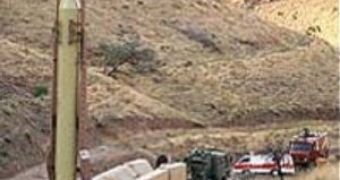China's shootdown of an old communication satellite two months ago using a new missile was the first successful demonstration of an anti-satellite missile by any country in more than 20 years. The U.S. perceived the test not only as a proof of China's increasing military capabilities and ambitions, but also as a possible threat to its dominance in military space.
The problem is that anti-satellite systems could also be used by terrorist organizations like Al-Qaeda, since satellite tracking software is freely available on the Internet and so is most of the physics involved in launching an intermediate range rocket against these satellites.
So it seems that such an attack is not so sophisticated and doesn't require the latest technologies to deploy, only modest engineering capability and a limited budget. This means that a well financed terrorist organization or a small state with a point to prove could see an anti-satellite missile as an achievable task.
According to Adrian Gheorghe of Old Dominion University Norfolk, in Virginia, USA and Dan Vamanu of "Horia Hulubei" National Institute of Physics and Nuclear Engineering, in Bucharest, Romania, all types of geosynchronous satellites are at risk and could become the next victims of a terrorist attack.
So, ranging from satellite TV systems, weather satellites, global positioning systems to military satellites are located in a vulnerable environment. The team of scientists used only a "mathematical game" and textbook physics equations for ballistics to demonstrate a computer model showing that anti-satellite weaponry is a real possibility.
Intermediate range missiles are easy to come by at all major arms dealers terrorists are well connected to, so many nations and organizations with sufficient funds and a college-level team dedicated to the cause could proceed to such an attack.
"Any country in possession of intermediate range rockets may mount a grotesquely unsophisticated attack on another's satellites given the political short-sightedness that would be blind to a potentially devastating retaliation," the researchers say.
The conclusion of the study is that deliberate satellite sabotage should be placed higher on the security agenda of countries targeted before by terrorist attacks.

 14 DAY TRIAL //
14 DAY TRIAL //